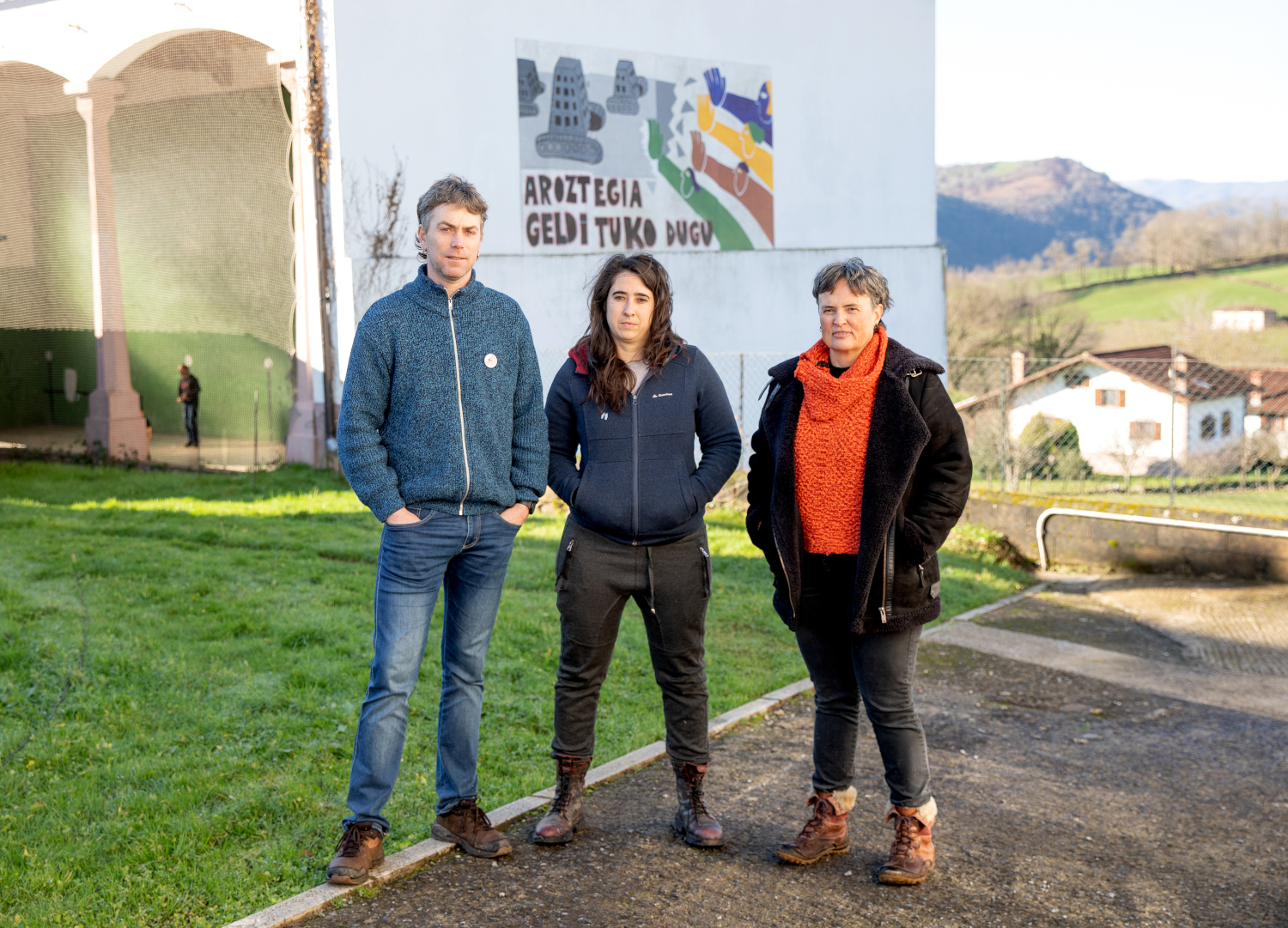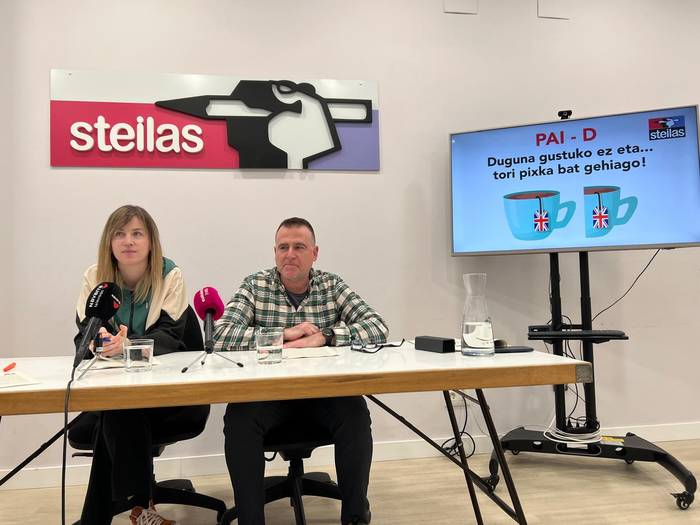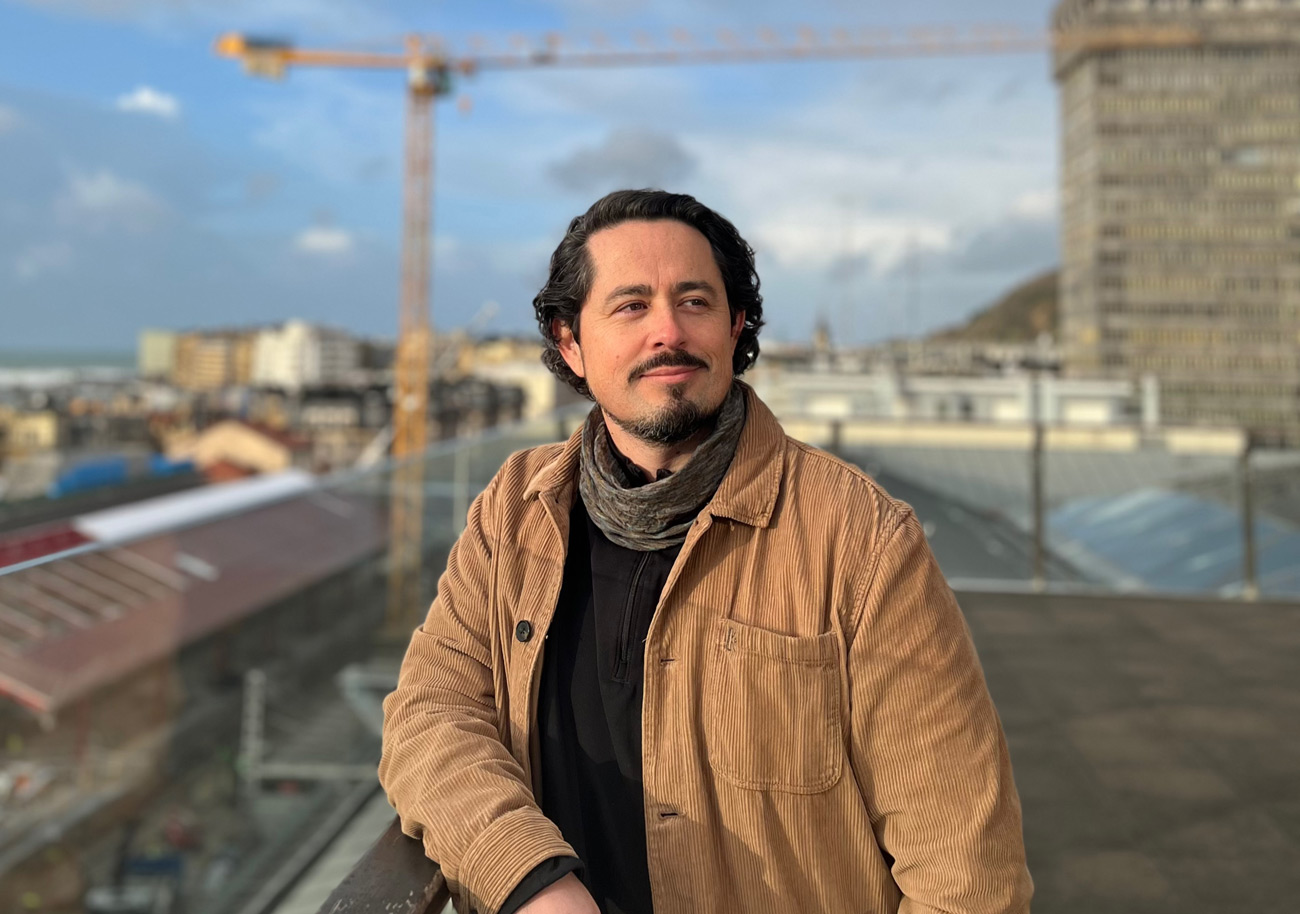Working for Castilian speakers to recognize the Basque community
- Feminism puts oppression beyond gender on the table and claims the path of brotherhood, knowing that the path is conflicting. Where and how is the oppression against our language and culture? Mariluz Esteban, Saioa Iraola and Elurre Iriarte will analyze in the Euskara and Feminismoa bidelagun conferences the steps to be taken in feminism. The sessions were organized by Emakunde and the Vice-Ministry of Linguistic Policy of the Basque Government.
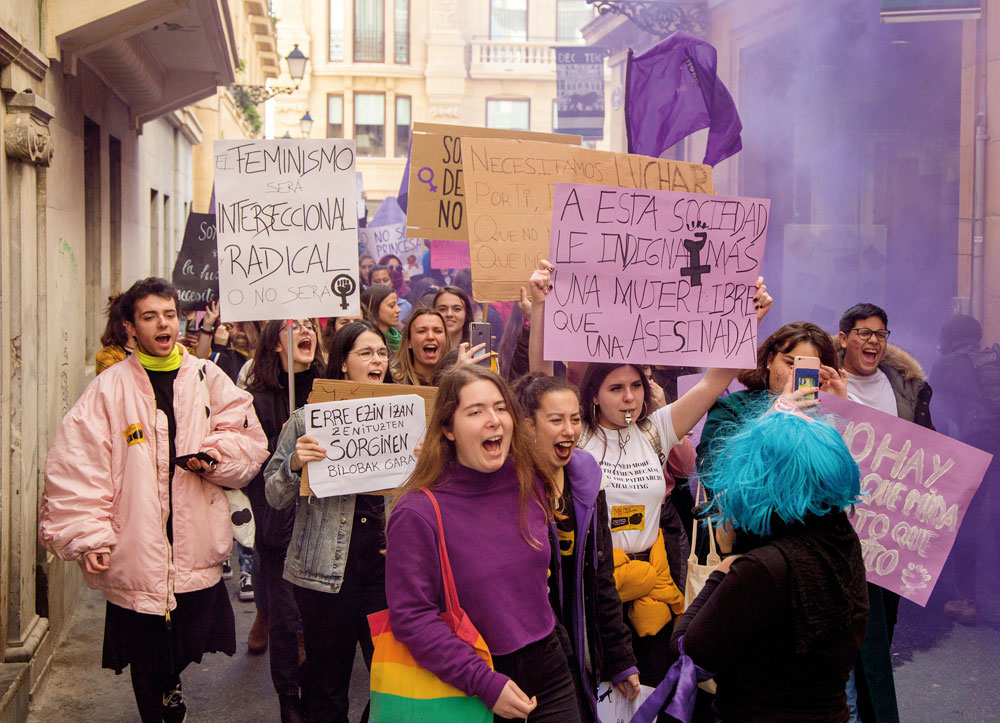
Mariluz Esteban (professor of social anthropology at the UPV/EHU and member of the feminist movement), Saioa Iraola (member of Euskal Herriko Bilgune Feminist) and Elurre Iriarte (cultural activist and member of the feminist movement in Baztan) participated in the Zubiak session between feminism and Euskera.
Summaries of the reflections of the three partners are set out below.
“It is necessary to expand decolonial theories to introduce the theme of language”
Mariluz Esteban Premio

In the feminism of Euskal Herria, and specifically around Euskera, what theory and practice do we need to make feminism rooted here, taking into account diversity and social inequalities? I would like to work on two words that must be taken into account in that path and that have left us short and poor.
Plurality: What do we talk about when we talk about plurality? In general, we refer to migration, ethnicity and cultural or geographical origin. In the background are age, social class, language, ideology, sexuality, religion, etc. This, among other consequences, leads to dichotomies here and abroad being maintained like us and others. We need to think about feminism, but also about Euskera, how we want to manage diversity.
We should do what feminism has always done: to seek transversality, that is, to introduce feminism everywhere and, at the same time, to achieve specificity, that is, to find spaces and times of their own in some moments. We should do something similar to plurality. If we treat diversity as something exceptional, and also in a limited way, not only do we treat people differently, but we also reinforce dichotomies. And I see another danger: we fortify positions. We don't meet.
Intersectionality: We're understanding this word as if it was a sum, and it's not, it's a union. In other words, I would say that intersectionality is the combination of subordination factors that in themselves are very difficult to reconcile. One example: we can say that Euskera is the national or popular category and most listeners will agree. Another example: we can talk about the coloniality or decoloniality of Euskera, but we can also say that Euskera is a class category. Nowadays, in the Basque Country, Euskera is a class category. Joseba Zalakain published in Berria the opinion article Txiren hizkuntza (the language of the poor). In Euskal Herria, one of the languages of the poor is Spanish. It is, on the one hand, the language of the poor and, on the other, one of the languages used to impose cultural hegemony. Theory and political practice are very complicated to us, but we have to do an exercise to articulate all that.
Mariluz Esteban: "Spanish is, on the one hand, the language of the poor and, on the other, one of the languages used to impose cultural hegemony. Theory and political practice are very complicated for us, but we have to do an exercise to articulate all that."
Amaia Astobiza said in an article published in Berria: “If we want to make visible the struggles of the racialized women of the people and make known the precarious working conditions of the people who work in the feminized sectors, how are we going to do it only in Euskera?” And here comes a topic mentioned by Lutxo Egia [in the second tertulia of this cycle]: the need to move. If I am not mistaken, he said that we are doomed to go and my question is: Is that negative? I believe that today we are obliged to pass. Another thing is how to do that traffic so that the Basque country does not lose out, but the transients seem necessary to me. It is a very difficult exercise, but we cannot avoid it.
Today we are talking about the decolonial theory of explaining all this. I won't find anything, but I would say that we need a multiple decolonial theory, from different directions. Why? On the one hand, we have to recognise that both from Europe and from other countries, colonialisms have been taken and are being taken to other parts of the world. On the other hand, in Europe, for example, monolingualism was used and continues to be used to create and organise national states. So we need a decolonial theory in different directions, I think that's where we are, but I wanted to emphasize, because there are theories that need to be expanded to include the topic of language.
In conclusion, I would like to mention three things. First of all, we have made an effort above all to make general diagnoses. We lack particular diagnoses. I mean, what we are doing people to people, the difficulties that have been encountered, the contributions that are made… and we need to talk about it.
Secondly, when issues are not easy, when they are conflicting, how do we conduct the debates? I think we're not always right. For example, we feel it is important to explain publicly the different positions, that everyone should say whatever they want. It's interesting, but you have to measure when, who and above all for what. Some issues we turn them into shows, this issue or feminism in general, and then the results either we don't control them or they're not what organizers want. Private debates are very important, I do not know if we are doing enough.
And finally, a question. What are we translating into Euskera and what do we publish? I know we have an excellent crew of feminist translators and not just because they're looking for the right words, but because they're creating a feminist theory through translation. All right, but what do we translate, investigate, publish? This will mark feminism in the Basque Country in the medium and perhaps long term. Through that we are feeding, creating, creating the feminism of Euskal Herria. It is a great responsibility. Especially if we want to create a feminism that takes account of external and internal colonialism, that takes account of diversity, but that takes account of social inequalities (including that of the Basque Country), and also that rooted here. If we want feminism like that, what we're doing will lead us down that road or the speeches and practices go down different paths?
“The development of free and public Euskaldunization media has become a feminist demand”
Saioa Iraola Urkiola

I will set out the current reality and the challenges we face. As I said earlier, Euskera has become an intention of the feminist movement, and I do not mean being bilingual posters or translating round tables. I'm talking about functioning, the vision of movement and the feminist articulation.
Now in this permanent one, I'd like to mention six keys.
Firstly, feminism in Euskal Herria has tried to cover all the margins of oppression, but in the case of minority languages it has cost, that is, the tendency to hegemonic languages has prevailed on many occasions, although it is understood that the exclusion of small languages is another consequence of patriarchal, capitalist and imperialist domination. However, I believe that the movement is debating the issue and developing proposals in recent years, but it is not easy, we often tend to escalate the struggles. A feminist, anticapitalist alternative… and we have to get all of them to feel sisters. Furthermore, in this time of crisis, I believe it is more necessary than ever that class struggle, land and territory defence and feminism go hand in hand. In the days it has been said that Euskera is a question of justice and feminism aims at social justice in all areas.
Secondly, I would like to mention the V Feminist Conferences of the Basque Country, which were very important in the path that the feminist movement is carrying out in relation to the Basque Country. Euskera was placed as a language of cohesion, an effort was made to preserve diversity among feminists and linguistic criteria were established. It was intended to respond to our diverse linguistic reality, but an effort was also made to understand language as a collective and political issue and for the feminist movement to become Euskere.
In addition, and I believe that for the first time in history, the Vice-Ministry of Linguistic Policy subsidized the days to put the language means in place. Shared responsibility is important. The movement is responsible for putting tools into the intention of valuing linguistic diversity and bringing the Basque to the center, but also the institutions.
Saioa Iraola: "Feminism in Euskal Herria has tried to cover all the extremes of oppression, but in the case of minority languages it has cost him, that is, the tendency to hegemonic languages has prevailed on many occasions"
But, despite this, we are criticized for the scarce presence of the Basque Country, according to some. The criticisms are welcome, I understand them, but I would like to acknowledge the path taken at the moment and to highlight the consensus achieved. Fortunately, we're polishing the edges and picking up women of all kinds in the center. And I agree, we need to discuss this more. We must politicize, disseminate and legitimize the effort we are going to make to promote Euskera and the feminist culture in Euskera, and all organized feminists should understand and assume this. On the other hand, we have realized that in order to build alliances, respect for other languages and cultures that exist here is essential. Some of them are also non-hegemonic languages.
Thirdly, for many militants, the feminist movement is its main area of Euskaldunization and Euskaldunization, and in many cases the only one. In other words, we cannot limit Euskaldunization to the management of the Basque Country or to mutual understanding. We will continue to be whisperers, translation headsets and self-managed courses in Euskera, but it is not only that, and this is not only the responsibility of the Basque feminists, it is the responsibility of all Euskaltzales and Euskaldunes. In order to bring feminist women closer to the Basque Country and to the Basque culture and not to die by besieging the Basque Country, the Basque Country has to relate to many things: to the land, to dream, to the revolution, to the edges… It seems essential to reverse the traditional imaginary of the Basque Country (linked to nationalism) and the postmodern imaginary of Castilian. For this, alliances are needed between the departments of Euskera, Feminism, Euskera and Equality.
Fourthly, the development of free and public Euskaldunization media has become a feminist demand. Euskaldunization is not only ideological, it is also a matter of class.
Fifthly, we need spaces to make our journeys. For example, I am now a technique of equality in Pasaia, and the Department of Equality, Euskera and Migration are working together. Once a month, we create spaces for people of different backgrounds and natives to get to know each other and discuss different issues, so that we can make small agreements in our peoples.
Finally, our feminism has a great ability to activate, see only the 8M mobilizations of the last two years, but it poses new challenges on the table. From the mobilizations of the two years in Bilbao it was said that they were very Spanish. If the number of people who meet at the demonstration is not Euskaldun on a daily basis, what effort does the movement have to make? It is not our responsibility (we do not even have the capacity) to Euskaldunify all feminists, but instead, within our possibilities is the respect and recognition of the non-Basque feminists present in Euskal Herria, the Basque community and feminisms.
“How long will we continue to whisper, making simultaneous translations and parallel meetings?”
Elurre Iriarte Báñez
.jpg)
Where have we been crossed by Euskera and feminism in Baztan? Well, I'm going to do two stories straight away.
The first report is directly related to the feminist movement. In feminism we have crossed linguistic oppression, or we have had debates about it, with joint campaigns, be it M8, World Women’s March… When we have gathered together different feminist movements we have created debates that we have wanted to make alliances with the Spanish speakers or with those who have migrated in recent years. The discussions always take place between the Basques, for one reason or another we discuss whether Spanish has to be put at the centre. As an example, the last M8M held a workshop on feminist economics and set out to do so in Spanish. A curious thing: in recent years there have been, among others, Peru, Nicaragua, China, Russia, Morocco and Romania, because alliances with non-Spanish migrants are never planned. I think it is a consequence of linguistic oppression.
Nor do we take into account the language oppression that they bring from their countries. We have tried to pull and it cannot work. Many times we want to take them home, rather than do it together. We need to improve. We have not been able to listen to each other, us and ourselves. The programme has told us that we too have to tell what our repression is. Apart from the migrants and the Spanish speakers, when we participate in wider campaigns, when we go to Pamplona, we have often had to deny our identity, because the Basque country is going to be in the background. They have to be solved, I do not know how, but there is no doubt that we have to do it together, but not from the Spanish, but from the Basque.
The discussions we have had are constructive, but also those that come before us. 50 years ago, the presence of men in female spaces is currently being discussed. Here too. We look for solutions such as whispers, simultaneous translations, parallel meetings... The programme refers to self-managed courses and is key, but the question is: How long do we have to devote this effort? Do we have to ask for the same thing back? What I've whispered to you, can you tell me one day that you don't mumble that you now understand it? Something will have to come back.
With gender oppression, we don't act the same way on many occasions, we ask men, we don't work to make them feel comfortable with us or in feminism. We ask, and they have to do their job. We should ask the Spaniards speaking, I think that is the time. Often the words attract, seduce, seduce are used. In the first round of the cycle, the question was asked: “How to seduce the Castilian speakers?” We have to make that word disappear from the dictionary. We cannot always be beautiful and beautiful to bring men closer to us, and the same with Castilian speakers. The word we should use is called into question.
The cycle mentioned the need for the Administration to provide resources free of charge. I also liked the most self-managed school. If we have to do that, we will. We also need courses to empower Basques.
Elurre Iriarte: “We have to make
the word seduce disappear from the dictionary. We cannot always be beautiful and beautiful to bring men closer to us, and the same with Castilian speakers.”
I will follow my second story. I am a member of the ‘Plazara dantzara’ group and we have fought for the participation of women in boys’ dance, a dance of great tradition. In the group we have not had a discussion about Euskera, it has been created in Basque and has worked in Basque. It was clear from the outset that we were not going to end repression.
We have been consistent and I give an example that it is possible to see. Exclusionary men are Spanish speakers, at least representatives. We met. They tell us when, how, where and with whom we have to dance, and we don't listen to them. In preparing the meeting we realized that they would do it in Spanish and we realized that, besides ever telling us who and with whom, they would also tell us in which language we should dance. We decided not to listen. In the plenary there was talk in Basque. They understood what the moderator or ourselves understood or translated.
On this journey we discovered that language and gender have a direct relationship, but also classes. Most of the exclusionary men are Spanish speakers and have economic power in the Baztan Valley. There are many Euskaldunes, but most live in Spanish and the group works in Spanish. Men take the role of victims, “they don’t let us dance,” they tell us. They don't want to dance with us, or as they dance we go in and they stand, they create a pasacalles. It's the same as language. How many times have we heard that we impose language?
Boy dance is a conflict in local culture, and those men who are against it have been living in the Baztan for years or were born there. However, they make no effort to learn, use or understand Euskera. Why will they use it or learn it if it doesn't give them the power? The key is that Euskera has weight, that people feel the need to understand or use it.
What conclusions have we drawn with these two routes and what are the challenges we have? These experiences have taught us that we are talking about the same body, Euskera and feminism, that is, that as a woman and as a Basque I cannot distinguish the two I: if I am doing feminism I cannot ignore the oppression of the Basque Country and if I am working in Euskera I cannot ignore feminism. Both oppressions are united, the struggles should also be united. Empowerment is also going to come like this: we are empowering women by the hand of feminism, and if we speak in Euskera, the Basque will also be empowered, and so will the Basque world, if we are talking about feminism in the Basque world, feminism will also be strengthened.
Finally, two challenges from feminism to put Euskera at the center and do not want to have the recipe. On the one hand, it is important to visualize oppression, because if we normalize oppression, we cannot empower ourselves. On the other hand, we must learn to denounce the aggressions that occur in linguistic oppression.
Days of support for Euskera and feminism
On Tuesday, November 2020, the following four round tables were held:
“Language and gender: a theoretical approach” (Lorea Agirre and Idurre Eskisabel)
“We are not born Basques, we are” (Lutxo Egia and Irene Bitxats)
“Language, gender and other subordinations” (Palmira Dual, Leocadia Bueriberi and Tarana Karim)
“Bridges between feminism and Euskalgintza” (Mariluz Esteban, Saioa Iraola and Elurre Iriarte).
In this link you have the chronicles of the sessions held by the journalist June Fernández.
Euskal Herrian Euskarazen arabera, Tolosako tren geltokiko segurtasun agente batek eraso egin zion militante bati, agenteari euskaraz hitz egiteko eskatu ziolako. Tolosako alkateak "kezka" adierazi du eta azalpenak eskatuko dituela jakinarazi.
Otsailaren 28an Hendaian eman dio hasiera kanpainari Herri Urratsek. Euskararen transmisioa bermatzen duen Seaska babestea da helburua.
EH Bilduk sustatuta, Hondarribiako udalak euskara sustatzeko diru-laguntzetan aldaketak egin eta laguntza-lerro berri bat sortu du. Horri esker, erabat doakoak izango dira euskalduntze ikastaroak, besteak beste.
Gukak “Bilbo erdalduntzen duen makina” ikusaraziko du kanpainaren bidez. 24 orduz martxan dagoen makina salatuko dute, eta berori “elikatu eta olioztatzen dutenek” ardurak hartzea eskatuko dute. Euskararen aldeko mekanismoak aktibatzea aldarrikatuko dute.
Plazara, AEK, Uda Leku, Dindaia eta Ebete antolakundeak Baionan elkartu dira Famili'on egonaldi ibiltariaren lehen edizioa aurkezteko. Hizkuntza mailaren arabera eskaintza bat edo beste egongo da eta haur zein gurasoentzat izango da udaberrian.
Hamahiru ZirHika kide batu dira hitanoaren erabilera aldarrikatzeko eta antolakundearen ekintzen berri emateko. Azalpenak Badihardugu elkarteko Idoia Etxeberria eta Galtzaundiko Uxoa Elustondok egin dituzte. Horiei, Andoni Egaña eta Amaia Agirre bertsolariak eta... [+]
Administrazio Epaitegiak arrazoia eman dio EH Bilduk Lizarrako plantilla organikoaren hizkutnz profilen aurka jarritako helegiteari.
Ilbeltzeko igande goiz batez jo dugu Baztanera. Eguzkiak oraindik ez du Lekarozko plaza argitu; bertan elkartu gara Garbiñe Elizegi Narbarte, Itziar Torres Letona eta Ernesto Prat Urzainkirekin. Itzaletan hotz egiten du eta umorez goxatu dugu lehen agurra, hogei urtean... [+]














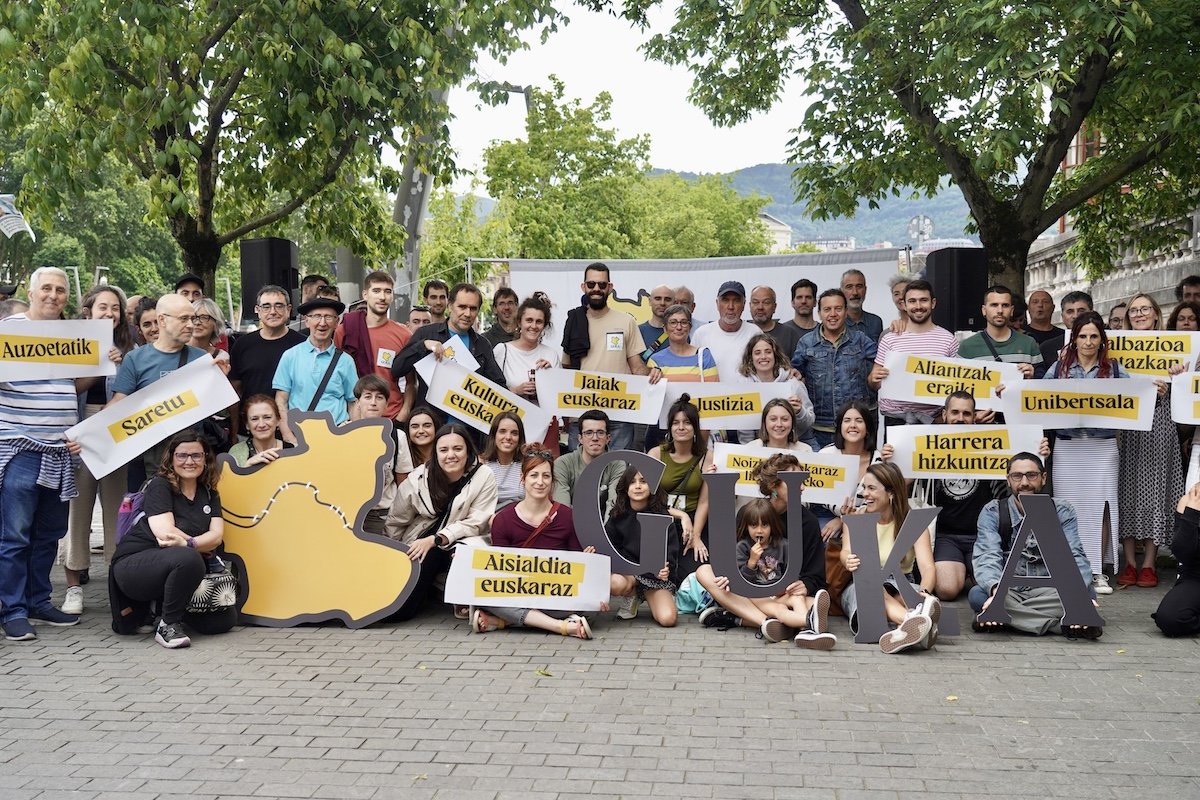



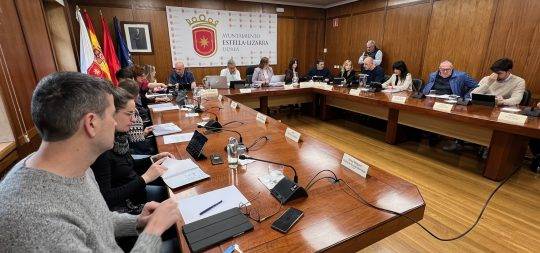
.jpg)
